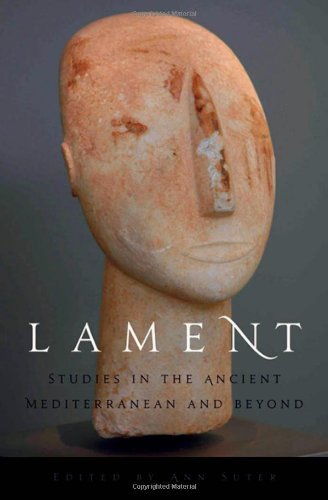Lament: Studies in the Ancient Mediterranean and Beyond



Product Description
Lament seems to have been universal in the ancient world. As such, it is an excellent touchstone for the comparative study of attitudes towards death and the afterlife, human relations to the divine, views of the cosmos, and the constitution of the fabric of society in different times and places. This collection of essays offers the first ever comparative approach to ancient Mediterranean and Near Eastern traditions of lament. Beginning with the Sumerian and Hittite traditions, the volume moves on to examine Bronze Age iconographic representations of lamentation, Homeric lament, depictions of lament in Greek tragedy and parodic comedy, and finally lament in ancient Rome. The list of contributors includes such noted scholars as Richard Martin, Ian Rutherford, and Alison Keith.Lament comes at a time when the conclusions of the first wave of the study of lament-especially Greek lament-have received widespread acceptance, including the notions that lament is a female genre; that men risked feminization if they lamented; that there were efforts to control female lamentation; and that a lamenting woman was a powerful figure and a threat to the orderly functioning of the male public sphere. Lament revisits these issues by reexamining what kinds of functions the term lament can include, and by expanding the study of lament to other genres of literature, cultures, and periods in the ancient world. The studies included here reflect the variety of critical issues raised over the past 25 years, and as such, provide an overview of the history of critical thinking on the subject.
Lament: Studies in the Ancient Mediterranean and Beyond Review
The glowing editorial reviews above do not overstate the superb academic quality of this publication.The collection rises to the challenge of providing a study of the lament tradition in a range of ancient cultures, and in a range of generic contexts, reflecting upon the critical issues that have been raised in previous scholarship, furthering the critical thinking in each case, and facilitating comparative analysis. The Greek World receives most attention (with 7 - more than half - of the contributions dedicated to it, covering the period from the Bronze Age to the 4th Cent BC) while the remaining 4 contributions treat Eastern traditions and then the Roman World.
The volume is suitable for the specialist (especially social, gender and literary historians) rather than the general reader. Each essay provides focused enquiry into some aspect of the lament tradition, often a neglected aspect (eg. the 'Nenia' in Ancient Rome). Each study is well contextualised within lament scholarship, meticulously researched and thoroughly referenced - notes and bibliography at the end of each chapter - as is to be expected from scholars of high academic standing. All quotations are translated into English (and most contributors also quote the original).
In sum, an excellent production and highly desirable addition to the library of those with a special interest in the field.
Most of the consumer Reviews tell that the "Lament: Studies in the Ancient Mediterranean and Beyond" are high quality item. You can read each testimony from consumers to find out cons and pros from Lament: Studies in the Ancient Mediterranean and Beyond ...

No comments:
Post a Comment